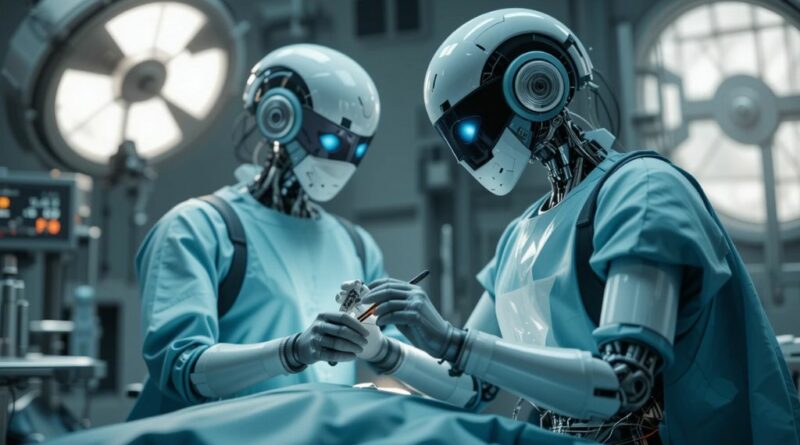DeepMind’s Medical Miracles
In the gleaming laboratories of Google DeepMind, scientists are rewriting the rules of medical research. Their artificial intelligence systems aren’t just accelerating discovery—they’re fundamentally transforming how we understand disease and develop treatments. What once took researchers decades might now be accomplished in mere weeks, potentially saving millions of lives in the process.
The Visionary Behind the Revolution
“AI could compress a decade of drug discovery into just weeks,” says Demis Hassabis, CEO of Google DeepMind, in a revelatory interview with CBS 60 Minutes. The British artificial intelligence researcher and entrepreneur isn’t known for hyperbole—his careful predictions have consistently materialized into groundbreaking achievements that have stunned the scientific community.
Hassabis, who co-founded DeepMind in 2010 before its acquisition by Google in 2014, is leading what many consider to be the most advanced AI research organisation in the world. With a background in neuroscience and computer science, he brings a unique perspective to the intersection of human intelligence and machine learning.
AlphaFold: The Protein Revolution
The crown jewel in DeepMind’s scientific achievements is AlphaFold, an AI system that has mapped over 200 million protein structures—essentially solving a problem that has vexed biologists for decades. This breakthrough isn’t merely an incremental advancement; it represents a quantum leap in our understanding of the fundamental building blocks of life.
“Understanding these proteins is the key to developing treatments for almost every disease,” Hassabis explains. Proteins are the molecular machines that carry out nearly all cellular functions. Their three-dimensional structures determine how they interact with other molecules, including potential drugs.
Before AlphaFold, determining a single protein structure could take years of painstaking laboratory work. Now, researchers worldwide can access this vast database of protein structures freely, accelerating research across countless diseases simultaneously.
From Laboratory to Bedside
The implications for medicine are profound. Drug discovery traditionally follows a lengthy path from initial research to approved treatments:
- Target identification: Finding the protein involved in a disease
- Lead discovery: Identifying molecules that interact with the target
- Optimisation: Refining these molecules for safety and efficacy
- Preclinical testing: Laboratory and animal studies
- Clinical trials: Human testing in three progressively larger phases
- Regulatory approval: Government authorisation for public use
This process typically takes 10-15 years and costs billions of pounds. AI systems like those developed at DeepMind can potentially compress several of these stages dramatically, particularly the early research phases.
Beyond Proteins: The Next Frontiers
DeepMind’s ambitions extend beyond protein folding. The company is developing AI systems that can predict how drugs will interact with biological systems, simulate complex cellular processes, and even design entirely new molecules tailored to specific medical needs.
In collaboration with pharmaceutical companies, DeepMind is already applying these technologies to challenging disease areas including cancer, neurodegenerative disorders, and infectious diseases.
Ethical Considerations and Human Oversight
Despite his enthusiasm, Hassabis remains measured about AI’s role in medicine. “It’s not a matter of if, but how safely and responsibly we do it,” he cautions. The DeepMind CEO emphasises that AI should augment human expertise rather than replace it, with physicians and scientists maintaining ultimate oversight.
The company has established rigorous ethical frameworks for its medical AI research, including stringent data privacy protections and transparency in how algorithms make predictions. These safeguards are essential as AI systems become increasingly integrated into healthcare systems worldwide.
The Future of Medicine
“The future of medicine may lie not in pills and procedures, but in code,” Hassabis suggests. This vision represents a profound shift in how we conceptualise healthcare—from reactive treatment to proactive prevention, from generalised approaches to personalised medicine, and from serendipitous discovery to systematic innovation.
AI-powered tools are already being deployed in medical settings for diagnostic imaging, treatment planning, and hospital resource management. As these systems become more sophisticated, they could transform every aspect of healthcare delivery.
Challenges and Limitations
Despite the tremendous promise, significant challenges remain. Regulatory frameworks for AI in medicine are still evolving, and questions about liability, privacy, and equity need addressing. Moreover, the “black box” nature of some AI systems raises concerns about transparency and explainability in medical applications.
Technical hurdles also persist. Biological systems are extraordinarily complex, with countless interdependencies that even advanced AI systems struggle to fully model. And while AI can accelerate research, the safety testing of new treatments will still require time to ensure patient protection.
A Collaborative Future
The most promising path forward lies in collaboration—between AI researchers and medical professionals, between private companies and public institutions, and between technological innovation and ethical oversight.
“We’re entering a new era of science,” Hassabis asserts, one where the boundaries between disciplines blur and where computation becomes as fundamental to discovery as observation and experimentation.
As DeepMind and other AI research organisations continue pushing these boundaries, the pace of medical innovation may indeed accelerate beyond what previous generations could have imagined. For patients awaiting treatments for currently incurable conditions, this acceleration offers not just scientific interest, but genuine hope.
The revolution in medicine isn’t coming—it’s already here, written in the language of algorithms and embodied in the structures of proteins that hold the secrets to our health and wellbeing.
We’d love your questions or comments on today’s topic!
For more articles like this one, click here.
Thought for the day:
“It’s great to be great, but it’s greater to be human.” Will Rogers



